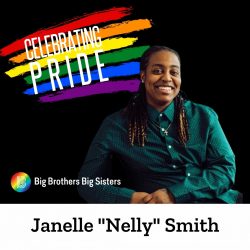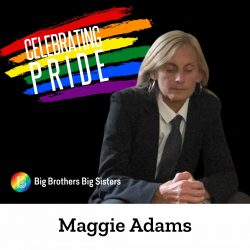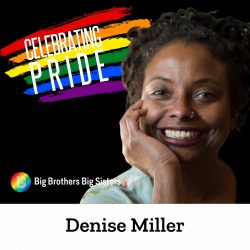Celebrating Pride: Donta Andrews
Big Brothers Big Sisters of Southwest Michigan is proud to celebrate Local Pride throughout June. Sign up for our e.news to get updates in your inbox and learn more about Pride in your community.
Donta Andrews (he/him/his) always knew he was gay. He explains that in early elementary school, he told his mom about a boy he had a crush on. The silence in her response was so thick he felt he must have said something wrong. This was confusing to him as a child, he explains. The crush made him smile, so it must have been good, right?
The tension Andrews felt as an elementary school student is, unfortunately, startlingly common for young gay children who express their feelings. This sensitive topic can come as a surprise to parents. Parents will often respond to their child just like Andrews’ mom did – with deafening silence.
This silence ultimately acted as a catalyst for Andrews, who works in Corporate Communications for a global healthcare company and is a dad, husband, and poet.
“I HAD TO FIGHT PHYSICALLY”
He explains that in school, kids would bully him because he was so effeminate, and would call him “fag” and “girly.” “The bullying never worked though,” Andrews smiles. “I would hit back.” Andrews explains he was raised to never allow someone to bully him. He would get into fights regularly and eventually made a reputation for himself. Bullies knew not to mess with him.
Andrews explains, “I knew I had to fight physically … and it created this weird inner conflict where I knew who I was as a gay black person wasn’t wrong … but there were people who thought gay and black were 100% wrong.”
Even though kids knew he would not tolerate being bullied, they would still talk about Andrews behind his back. So, in an effort to convince them that he was straight, Andrews learned to “fake” who he was. He had a girlfriend every school year.
COMING OUT
By the time Andrews was in high school, he couldn’t continue trying convince himself that what he was doing was okay. He knew his actions were hurting girls who actually really liked him, so he stopped faking it. Andrews knew he didn’t want to pretend anymore. He explains that in adulthood, he knew that his options were to either come out, or to commit suicide – he didn’t see another option.
Andrews describes his coming out experience as “boring.” He recalls nervously telling his best friend that he had something important to tell her. He wasn’t sure how she would react. Andrews explains he finally mustered up the courage to say, “I’m gay.” His friend responded, “I thought you were actually going to tell me something.” She was not surprised at all.
After Andrews told his best friend, he knew he needed to tell their other close friends. He told the most important people in his life, and once he did, he felt free to finally be himself. What other people thought of him didn’t matter anymore because he knew that the people closest to him loved him, regardless of who he loved.
ADVICE FOR MY YOUNGER SELF
We asked Andrews this question: if you could give your younger self some advice, what would it be?
Andrews shares, “It does get better. You are okay. You are enough … You’re good. People who don’t think you’re good, will eventually catch up.”
These days, Donta Andrews breaks the silence by serving as the vice-president of the African Ancestry employee resource group at the company he works for, as well as participating in the LGBTQ employee resource group. He shares, “Women issues, race issues, LGBTQ issues are human issues. If you are human, you should care about them, and if you don’t care about them, you should be examining that.”



